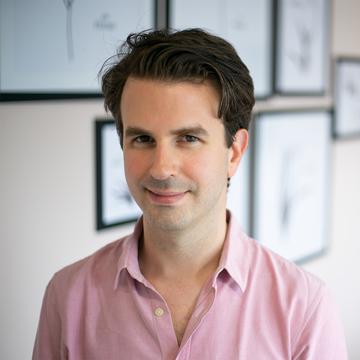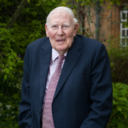ARON GELBARD (JESUS, 2000)

ARON GELBARD (JESUS, 2000)
The CEO and Co-Founder of letterbox flower delivery company Bloom & Wild talks about his transition into entrepreneurship, growing the business and keeping the values
Published: 12 April 2021
Share this podcast
The Alumni Office's Harriet Packer interviews Aron Gelbard (Jesus, 2000), the CEO and Co-Founder of letterbox flower delivery company Bloom & Wild (www.bloomandwild.com).
During the conversation Aron spoke about his transition into being an entrepreneur and starting a new breed of flower delivery company, one that not only focused on customer service but also on technology.
He spoke about growing an expanding business, the importance of keeping to it's core values and how they are staying sustainable and reducing their carbon footprint; plus he gives his advice to future entrepreneurs.
**This interview was originally recorded in April 2019**
00:00 Today we are delighted to welcome Aron Gelbard, the CEO and Co–Founder of letterbox flower delivery company Bloom & Wild. Welcome Aron, and let’s dive straight in with what initially drew you to studying at Oxford?
I initially wanted to apply to Oxford because the reputation of the university is brilliant, and I guess when I was at school I hoped I’d be able to apply to Oxford or Cambridge – and really was drawn to Oxford. I went to an open day, really enjoyed how friendly the tutors were, and some of the other students I met were. I studied Modern Languages, and the course at Oxford really appealed to me; it had a lot of literature in it which, at the time, I was really interested in. It meant that I could go ahead with both languages all the way through to my fourth year, after my year abroad, which appealed to me as well. So I applied.
00:55 And how did you spend your year abroad?
I spent a year mostly in France. I did ten months in France working for a sort of industrial technology company. So actually, it was a great way to get some real life working experience while doing an academic degree, which is something that is quite difficult to do in the UK. And also learn a language in a practical setting, which is really appealing because the Oxford course is, or at the time was quite sort of academic, rather than practical. And then I spent the summer holiday at the end of my year abroad in Germany, on a sort of student exchange programme at Freiburg University, which is again organised through Oxford. So that was beneficial to have that link, to find somewhere to go.
1:44 Often people talk about being a student in Oxford, are there any memories that really stand out for you from your time there?
I remember I had, well I had lots of wonderful tutors, but a wonderful French tutor at Jesus (my college), Dr Pilkington, and the first time I had a one–to–one tutorial with him, (which I think was in my second year because we were in pairs in the first year), I started reading my essay to him. I thought he’d gone to sleep because his eyes were closed! I didn’t know what to do, and I was really embarrassed. Then I sort of got to the end of a paragraph and he sort of asserted something from three paragraphs earlier, that he had sort of been thinking about, and I totally misread it, and thought that maybe he found my essay boring or something. Actually he was in this deep reflection, and it made me sort of... I never really thought what it would be like to be in the tutor’s shoes, to have an essay of read to you and to absorb information, and start a discussion in that way. But I had even more respect for him after that.
2:49 That’s quite a unique aspect of Oxford, being in tutes; they’re such small groups and the studying is so intense, how did you find that experience?
I guess to start with it was quite, the whole sort of tutorial experience was quite intense. Having one–to–one or one–to–two teaching, that wasn’t something that I had ever had at a university, so that was new. But over time I guess I sort of learned that, I didn’t really know anything else, university–wise. I think there’s also fewer hours of structured teaching, but then the hours that there are, are in much smaller groups. So I didn’t go to all that many lectures. I think French and German is a relatively lecture–light subject, compared to science subjects, for example. So there’s a lot of independent study time and then the tutorial time is this very intense time to make up for it. So it’s a different model to, you know, spending hours in lectures all day. But then, I guess less scrutiny on me personally in each one.
3:51 Do you think that the Oxford system gave you any preparation going into the world of entrepreneurship?
It’s funny, there was quite a long gap between going to university... I left in 2004 and starting a company in 2013. But I think, if there is a link, it’s that scrutiny of being in a one–to–one environment and feeling like you don’t have anyone else to lean on and you figure things out for yourself. Certainly in situations like fundraising, it’s really my responsibility to get the funds raised for us to carry on seeing our plans for the company. Also in leadership situations – I’ve got a great leadership team around me, but ultimately it’s with me to set our direction as a company. And I do think that that one–to–one teaching in particular does set you up for that sort of thing.
4:43 So moving into that world of entrepreneurship – you initially worked at OC&C and then Bain, what sort of lessons did you take from them to implement in your own business?
I guess, unlike a lot of entrepreneurs, I hedged my bets and tried to get some savings built up, and also some experience in a proper company, before trying to set up my own. That was certainly beneficial; made me much more confident about trying to set up a company myself. I think I would have had no idea where to start if I tried to do it coming straight out of university without some of that experience of seeing how much bigger and more successful companies operated. Also both consulting firms that I worked at I worked quite a bit with businesses in the retail and technology areas. So that made me interested in e–commerce. I guess it also made me think I knew more about it than I did, because I thought it was just like a combination of the consulting work that I’d done. And actually, it’s really different trying to get an e–commerce company going off the ground, to consulting to a large retailer or technology company. But again, it gave me a bit more confidence that this was an area that I could have a go at setting up a company. And even if actually I had to figure out everything from scratch once it got started.
5:58 Tell us about Bloom & Wild. How did that come about to be the success it is?
Thank you. So I guess I started Bloom & Wild with a few things in mind. Firstly I moved to the UK when I was five. I was actually born in France. Didn’t speak any French there, so didn’t help me with my degree much. Just me and my mum, so I came as an only child and I felt myself trying to fit in everywhere I went. I think in order to fit in, you seek validation and feedback and try to please other people and that’s something that’s really stuck with me, and propelled me to try and do well at school and get good marks; and then again at university, and try and get good feedback from my manager when I had a job. But I was never a hundred percent fulfilled by that, and I wanted to do something where I was going to sort of get feedback on a much larger scale, and really that to be sort of what validated me. I’m really motivated by that – if people are pleased with what I’m doing, and that makes me really happy, and if they’re not, then I really care about it and I really want to do something different. So starting a flower company really struck me as selling a product where people only buy your product two or three times a year, but they buy it at really emotionally important occasions for them and their recipient and so you really have to get it right; and they really let you know if you haven’t got it right. That really motivated me, as somebody who is feedback driven. My dad’s an entrepreneur, and both my granddads were entrepreneurs. My mum’s dad started a chocolate company and so…it’s not directly related, but that sort of entrepreneurship was something that we talked about in my family as I grew up and that appealed to me as well. Then I guess on a more day to day level, I’d had frustrating experiences sending flowers on a number of occasions. And wondered if it would be possible to make it better, use better technology and make the delivery experience better. I used to be a customer of another company called Graze, which is actually led by another guy from my year at Jesus. We stayed in touch over time, and so I really like what they were doing with letterbox snack delivery. That was where I got the idea for trying to do letterbox flower delivery from.
8:17 That idea of creating a company that genuinely cares for your experience as a consumer seems really pivotal to you. How did you create the values when starting the company?
We do put a lot of emphasis on our values. We have five values at Bloom & Wild, which are care, pride, delight, customers first and innovation. And we co–created those values as a group of people, a couple of years after starting the company. And we’ve really stuck by them since then; we’ve not changed them at all. And I think everybody’s really bought into them, because we think about them when hiring people, when on–boarding and training people, when doing performance reviews for people and deciding promotions and things like that. And so we all really do try to think what we can do to do the right thing by our customers first and foremost. And that won’t necessarily be the thing that makes the company the most profit in the short term. But I think it’s more important that we build that reputation, and that people see that we really do care and that we take seriously the emotion that they’re trusting us with, or the conveying of emotion that they’re trusting us with.
9:23 You spoke about innovation as being a core value and Deloitte named you the second fastest growing company in the world back in 2018. How do you feel about being such an innovative leader in industry?
I’m really sometimes surprised by how rapidly we’ve been able to grow, by some of the awards, you know, that we’ve been lucky to win. You mentioned the Deloitte award for being UK second fastest growing company, which we were really shocked by. We have tried to be a combination of a tech company and a flower company. I don’t think we could be one without being the other. Our flowers are obviously what we sell, and we have a great group of people here who are really sort of creative and have a great appreciation of brand and really make our product stand out and we think that’s absolutely necessary in a market where people are shopping for the conveying of emotion. But so often just go to Google, and type in, ‘flower delivery’ and don’t really know what they’re getting. At the other end of the spectrum, we also need to be a brilliant technology company, because we need to, well we seek to scale really quickly, and we’ve been able to scale quickly before. And we need to build technology that will enable that scaling. And so, from the beginning, we’ve been a combination of customer service, marketing and creativity at one end of the spectrum and then sort of analysis, technology, data at the other end of the spectrum. I think that’s, it’s unusual to have that combination in the flower industry, a lot of people are either one or the other, rather than sort of bringing both together.
10:57 With all the accolades that Bloom & Wild is gaining, plus growing so quickly, has there been pressure from that?
There’s absolutely pressure from growing a company quickly. We’re now a team of about 90, and we were a team of 20 four years ago. So we are growing the team really quickly, and that’s a lot of salaries to pay every month, and we need a bigger office to accommodate everybody and things like that. So there definitely is sort of pressure to be able to sustain that. On the other hand, there’s a lot of excitement that comes with it as well. And I think that we’re growing within our means. We prepare budgets carefully each year and we know how much we can afford to spend on hiring and on other aspects of our growth. Then we plan in that way. So yes, there’s definitely pressure to sort of succeed, and to make sure that we look after our people. But it’s a responsibility that I’ve come up with and I feel that we’re growing within our means. There are companies that grow from 20 to 900 people or 9,000 people; in that case, often in the US rather than here and we’re not that sort of company. I mentioned the tension between being a flower company and a tech company. I think we’re also, there’s a bit of tension between being a company that’s backed by venture capital firms and is still loss making, growing really quickly, but then, on the other hand, being a company that’s, you know, always within reach of profitability and you know, is in control of our own destiny, rather than just planning the next money round all the time.
12:29 You’ve scaled up people–wise, but you’ve also scaled up in terms of where you’re delivering flowers to; you’ve now expanded into Europe. How do you envision the business growing in the future?
So when we started we were UK only. And then we started our international expansion into Germany and France and Ireland a couple of years ago. And really pleased to see our business growing in those countries more quickly than it’s growing in the UK. And probably at a lower base. Our goal is to expand Bloom & Wild further, hopefully into other countries in Europe and then maybe beyond Europe one day as well. But the UK is very much our core business, and we also hope that we can become the leading online flower company in the UK. We’re now number two, which is really exciting progress after six years. And in terms of customer reviews and ratings, we’re number one by a long way. So I hope that we can maintain those high standards and carry on working hard to give people a great experience. And then turn that into market leadership and giving that great experience to even more people each year.
13:35 It’s clearly very important to you that people have that wonderful experience of giving and receiving flowers, because it is such a personal one. What’s the biggest challenge of keeping the company to its values?
I think one of the biggest, probably the biggest challenge is maintaining our culture as we grow. Because we’re at a scale where I’m not doing everything myself. Or you know, not doing very many of the things myself, but it is my responsibility to keep our team sort of firing on all cylinders. And you know, make sure that our culture stays right as we grow, and that we continue to put our customers first and make the right decisions. That we’re on–boarding and training people in the right way, and setting them up for success. And so rather than, when I see something not working the way I think it should, rather than me trying to step in and change it myself, I’m trying to ask myself instead why is that not working in the way that’s right for our customers, and what can we do to change our processes or hiring or approach to get that kind of thing right in future. And that’s like a big mindset shift to me. Because when you start up as an entrepreneur, you have to do everything yourself. And then because you grow, well in our case have grown quickly in terms of team size, it’s been a big adjustment from having to do everything by myself to, you know, very rapidly it being better for me to do nothing by myself, and that transition happening maybe more rapidly than it would in a more traditional company.
15:08 You spoke there about having to do everything yourself at the beginning and now disseminating some of that, what would you say is a typical day for you, if there is one?
There’s obviously no such thing as a typical day. But in a typical week, I have one–to–ones with everybody on my team. I’ll normally have some type of interaction with some of our investors, like some stakeholders. Most weeks I’ll participate in larger group meetings internally, where I’ll give input where asked on projects that we’re working on or cross functional initiatives. For example, things between marketing, technology and operations. And I’ll do a number of third party meetings as well, with people that might be able to help us with our growth or our operations. And I spend quite a lot of my time interviewing new candidates as well; the team’s growing rapidly. And when we have new people, sort of welcoming them, on–boarding them, trying to explain the company and our direction to people. So real mix of how I spend my time at work.
16:13 You mentioned your initiatives there. There is, obviously, now a real focus on sustainability, how is Bloom & Wild going forward with that?
Bloom & Wild have got a really good focus on sustainability at the moment. There’s a number of initiatives that we’re working on at the moment. We’re trying to get all of our packaging to be completely recyclable, so we’ve been trialling biodegradable nets that go round the flower heads, instead of plastic ones, which is going well. At the moment, we’ve been looking at supply routes and benchmarking whether we’re better off growing flowers overseas and flying them to the UK or heating up greenhouses in the UK. It turns out in many cases, you’re better off growing flowers in their natural habitat, which is what we do in most cases. We’re actually working with some sustainability consultants at the moment for a full review of what we’re doing. And have them, with their expertise looking at lots of companies, help us ascertain what the highest priority projects are. Because on the one hand, it’s great that we’re doing... moving from plastic to biodegradable nets. On the other hand, we don’t have the expertise to know whether that’s number one priority thing we should be doing, or whether we should instead be looking at electric vehicles or, I don’t know, so it’s something else we talk about. But having somebody who’s an expert review our processes externally and tell us what the biggest impact we can have on reducing our impact on the planet is proving really helpful.
17:39 There are a number of keen undergraduates and graduates who have keen entrepreneurial aspirations, what advice would you give to them?
I think, if I was to have my time again, I maybe would have tried to be an entrepreneur more quickly. You asked me earlier about the impact of the tutorial system on preparing you for entrepreneurship. And I think in a way it really does prepare you, because you do learn to be in the spotlight and have to think on your feet and make decisions. And that’s so valuable. And when I was a student at Oxford, it felt like entrepreneurship wasn’t really an option that was presented to me as something that I could do right away. And it was, back then, a lot more around sort of milk round jobs and more traditional careers. And so I didn’t really think about starting a company at that time. But actually, I think if you’ve got that desire to do it, then you should give it a go. And even if you don’t succeed, you learn so much from doing it, from being an entrepreneur, that it can be a great first step career–wise, even if it’s not a success.
18:45 So taking you all the way back, to Oxford. How has Oxford changed you?
I think it’s a really special experience getting to study at Oxford. It’s something that you can’t take for granted, because it’s so beautiful, because it’s got brilliant people, because it’s got amazing teaching. I think you…I really appreciated having the chance to go through that experience. I think it then makes you appreciate things in life that work out positively, and you know, afterwards because you have this real sense of privilege, that you know so many people would like to have. And you know, that I was lucky enough to get to do. So I became very appreciative of that. Then I think it made me more appreciative of other things, as I’ve gone through life since then.




































